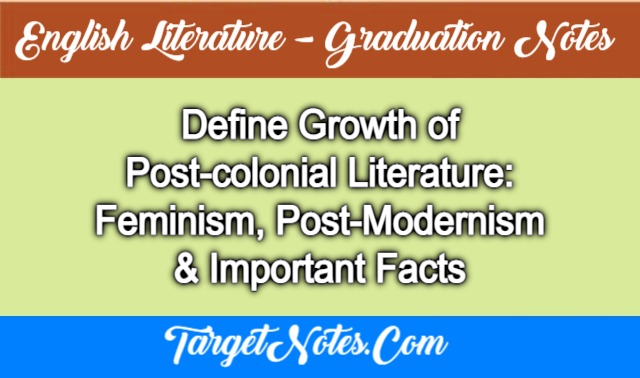
Define Growth of Post-colonial Literature: Feminism, Post-Modernism & Important Facts
Contents
Growth of Post-colonial Literature: Feminism, Post-Modernism & Important Facts
A Brief Introduction
Post-Colonial‘ literature (also postcolonial literature, New English literature and new English literatures) is a body of literary criticism that responds to the intellectual discourse of European colonization of the Middle East, Asia and Africa. Post colonial studies entail the critical destabilization of the intellectual and linguistic, social and economic theories support the western ways of thinking, of perceiving, understanding and knowing the world.
Post-modernism is a general and wide ranging term which is applied to many disciplines, including literature, art, economics, philosophy, architecture, fiction and literary criticism, sociology, ethics and morality, linguistic, history, politics, international relations, anthropology, visual arts and music. Post modernism gained significant popularity in the 1950 and dominated literature and art by the 1960s.
The history of ‘Feminism’ may be divided into two ways the First waves dates from 1830 to 1920. This period may be described as the period of the ‘Suffragette movement. The Second wave dates from 1960 to the Present Day. It organized around women’s liberation. The Feminist Movement that began in the nineteenth century the Feminist demanded social and political heights on equality basis with man. Mary Wollstone craft’s ‘A Vindication for the right of women’ laid the foundation of the Feminist movement. Virgenia Woolf’s’ ‘A Room of one’s own’ and simone de beauvoir’s The Second sex’ followed next.
Important Facts to Remember
1. Feminism is a collection of movement and ideologies aimed at defining, establishing and defending equal political, economic and social rights for women.
2. Feminist is an advocate or, supporter of the rights and equality of women. Feminist theory aims to understand the nature of gender inequality by examining women’s social roles and lived experience, it has developed theories in a variety of disciplines in order to respond to issues such an the social construction of sex perspectives.
3. Feminist theory is the extension of feminism into theoretical or philosophical fields. It encompasses work in a variety of disciplines, including anthropology. sociology, economics, women’s studies. literary criticism, art, history, psychoanalysis, and philosophy, Feminist theory.
4. Elizabeth Wright points out, “none of these French feminists align themselves with the feminist movement as it appeared in the Anglophone world”.
5. Post-modernism is a general and wide-ranging term which is applied to many disciplines, including literature, art, economics, philosophy, architecture, fiction and literary criticism.
6. Post-modernism is largely a reaction to scientific or objective efforts to explain reality. Post-modernism tends to be defined. either as the period after modernism or as a ‘condition’ whereby established values are rapidly eroded by new technological advances and a general apprehension of what the future will bring.
7. Post-modernism postulates that many, if not all apparent realities are only social constructs and are therefore subject to change. It claims that there is no absolute truth and that the way people perceive the word is subjective and emphasizes the role of language, power relations, and motivations in the formation of ideas and beliefs.
8. Post-modernist approaches therefore often consider the ways in which social dynamics, such as power and hierarchy, affect human conceptualizations f the world to have important effects on the way knowledge is constructed and used. Post-moderanist though often emphasizes constructivism, idealism, pluralism, relativism, and scepticism in its approaches to knowledge and understanding.
9. Post-modernism gained significant popularity in the 1950s and dominated literature and art by the 1960s. Post-modernism has influenced criticism architecture, many disciplines, including religion, literary sociology, ethics, and morality, history, politics, international anthropology, visual arts and music.
10. Post-colonial studies entail the critical destabilization of the intellectual and linguistic, social and economic theories that support the western ways of thinking, of perceiving, understanding, and knowing the world; thus is intellectual space created for the subaltern peoples to speak for themselves, in their own voices, and so produce alternative conversations to the dominant “us-and-them” discourse, between the colonist and the colonized.
11. The term ‘post-colonialism is applied literally-as the period after colonialism which is problematic, given that the de-colonized world is filled with contradictions, of half-finished processes, of confusions, of hybridity, and liminalities.
Related Link
- Write a note on the elements of a short story.
- Write a short note on narrative technique of a novel.
- What do you understand by Novel? What are the elements which are to considered in plot construction.
- Define The Poetic Drama & Important Facts
- What is Epic Theatre & its Important Facts?
- What is The Expressionism & Important Facts to Remember?
- What is the Theatre of the Absurd & Important Facts
- Define Drama of Ideas & Important Facts.
- Define The Problem Play & Important Facts.
Disclaimer






